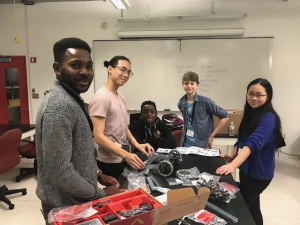Villanova Engineering Mentoring Program, VESTED, Introduces Philadelphia High School Students to Careers in Engineering
Started in 2006 as a pipeline-to-college program, 100 percent of the students who have participated in the program have gone on to college

VILLANOVA, Pa – Each winter, 50 students in grades 9-12, mostly from Philadelphia, spend seven Saturdays at the Villanova Engineering, Science, Technology, Enrichment and Development program (VESTED), exploring the world through a career lens in engineering. This exposure enhances their global awareness, develops their professional and technical skills, and creates a strong interest in pursuing a college degree.
Hosted by Villanova University’s College of Engineering, the program provides hands-on engineering projects ranging from virtual reality and programming robots to making batches of chocolate — the candy industry is one area that chemical engineering is applied.
Started in 2006 as a pipeline-to-college program, VESTED also mentors the students as they work on their college application and financial aid processes; gives guidance for succeeding in college, and supports them in identifying a career path.
Stephen Jones, PhD, Associate Dean of Student and Strategic Programs at Villanova’s College of Engineering, has directed the VESTED program since it was founded, and has been passionate about the need for greater diversity in the engineering profession. He says, “In addition to calculus, physics and biology that the students are learning in their high school, we are teaching them how those sciences are applied by using engineering methods, so they’re doing more building and creating. It’s an experience they’re unable to get in their high schools.”
Jones shares that there’s an added benefit, “I’ve found that not only are we teaching the high school student, but she or he might then teach their brother, parents, or a counselor or teacher at school, so now we’re spreading knowledge of what engineering is all about, and that’s a tremendous benefit,” says Jones. “VESTED and programs similar to it are important because everyone has something they can contribute to solving national and global problems, and we can achieve much more, and advance much faster, when everyone in the engineering profession is valued.”
Two to four VESTED students enroll at Villanova each year—though all of them may not necessarily enroll as engineering students—and more than half of them are first-generation students. There are many supports in place, including opportunities to participate in Villanova’s chapters of the National Society of Black Engineers and the Society for Hispanic Professional Engineers.
Ninety-five percent of VESTED students complete the program four or five times. At any given time there could be between four and eight VESTED students on campus each year. Some of the other colleges that the students have applied to and were accepted into are Temple University, Pennsylvania State University, Drexel University, Lehigh University, Howard University, University of Pittsburg, Widener University, Community College of Philadelphia, Delaware County Community College, Hampton University, Millersville University, Carnegie Mellon University, and Shippensburg University.
The American Society for Engineering Education’s most recent status report by the Association of Public and Land-grant Universities shows the overall number of engineering degrees conferred from 2011 to 2016 at each degree level continues to increase, with major increases for Hispanic and Black students. However, the increases in engineering degrees among underrepresented minority groups is not enough to close the gap in nearly every state between the share of engineering degrees and their representation in the college-age population of the state. What once was primarily an issue of equity and equal opportunity is now an issue of economic vitality and national security. Broadening diversity in engineering is necessary to meet the demands by employers for more workers in the U.S. with the scientific and innovation skills necessary for the tech-sectors driving economic growth.
About Villanova University: Since 1842, Villanova University’s Augustinian Catholic intellectual tradition has been the cornerstone of an academic community in which students learn to think critically, act compassionately and succeed while serving others. There are more than 10,000 undergraduate, graduate and law students in the University's six colleges—the College of Liberal Arts and Sciences, the Villanova School of Business, the College of Engineering, the M. Louise Fitzpatrick College of Nursing, the College of Professional Studies and the Villanova University Charles Widger School of Law. Ranked among the nation’s top universities, Villanova supports its students’ intellectual growth and prepares them to become ethical leaders who create positive change everywhere life takes them. For more, visit www.villanova.edu.
